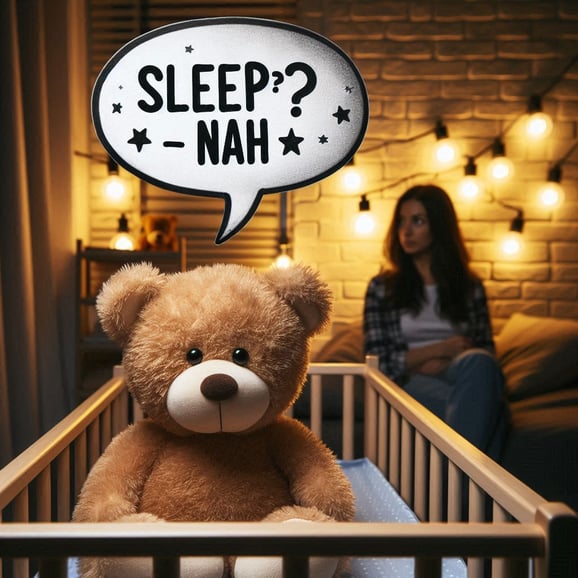The Intricacies of Undertiredness
Delve into the science behind undertiredness, understand how it functions, and learn about its effects on a baby’s sleep.
6/3/20242 min read


I often chat with parents who struggle to get their babies to sleep, and when I ask if they have any clues as to why, many suspect their little one might be either undertired or overtired. So, in this post, I’d love to delve into the concept of undertiredness to shed light on what it entails and how it affects a baby’s physical and mental well-being
What is Undertiredness? It’s a state where our little ones haven’t experienced sufficient physical and mental stimulation to feel the natural pull of sleep, often referred to as sleep pressure. Their bodies and minds require a certain amount of activity and stimulation to signal that it’s time for rest. 🛌.
Hormonal Effects on Sleep The dance of sleep in our babies’ lives is choreographed by a delicate balance of hormones. When undertiredness steps in, it’s like the music is off-tempo, and the dance becomes a bit chaotic 🎶.
Melatonin: This is the leading hormone that cues sleepiness. If a baby is undertired, they may not produce enough melatonin, which can delay the onset of sleep. It’s also worth noting that melatonin is produced in the dark, so it’s beneficial to let your baby nap and sleep at night in a dark room, at least until they’re 2 years old🌙.
Cortisol and Adrenaline: These are the hormones associated with stress and activity. Normally, their levels drop as bedtime nears, but if a baby is undertired, these hormones may stay high, keeping your little one alert and fussy. ⏰ If your baby seems fussier than usual, I recommend engaging in gentle play. Holding your baby close or stroking them can help. Physical interaction with a parent or familiar caregiver has been shown to reduce these hormone levels and soothe your baby.
Behavioral Implications As parents or caregivers, we observe our babies and learn to read their behaviors as signs of their needs. Undertiredness can be particularly tricky to interpret because it often masquerades as the opposite of what we expect 🎭.
Overactivity: Instead of winding down, an undertired baby might become more active, trying to expend the energy they still have 💪.
Resistance to Sleep: They may fight sleep, not out of defiance, but because their bodies simply aren’t ready for it 🚫🛏️.
Unusual Sleep Patterns: You might notice irregular sleep patterns, like shorter naps or unexpected wakefulness at night, as their internal sleep rhythm is out of sync 🔄.
Common Signs of Undertiredness
Alertness at expected sleep times 👀.
Difficulty settling down for sleep 😖.
Naps that end too soon ⏳.
Early wake-ups from naps without distress.
Bedtime resistance 🛌🚫.
Less Common Signs of Undertiredness
Subtle tired cues that are easy to miss 🕵️♂️.
Bursts of energy late in the day 🏃♂️💨.
Long periods of nighttime wakefulness 🌜👶.
Early morning rising with no return to sleep 🌅.
Embracing a Routine is all about finding the right balance for your baby’s sleep by tuning into their unique rhythm. It’s about crafting a routine that honors their need for both activity and rest. Your baby would benefit from a mix of physical and mental play during their active hours, ensuring that when it’s time for sleep, their little bodies and minds are primed for the restful slumber we all cherish. I would recommend you to establish a bedtime routine which would last at least 30 minutes. It will allow your baby to wind down and show if they are ready to go to sleep. Also remember, if you’re finding it tough, don’t push yourself to the limit and reach out. Together, we’ll find a way to help your little one drift off to peaceful sleep 🤱💤.
